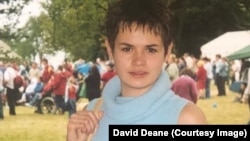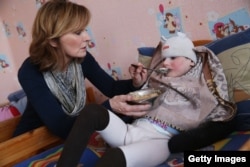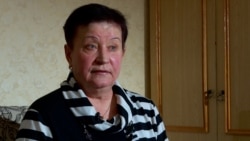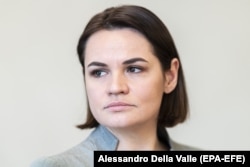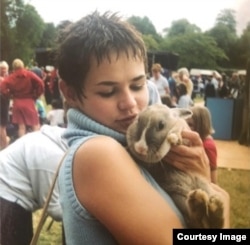In the wake of the Chernobyl nuclear disaster on April 26, 1986, parents in the hard-hit regions of Ukraine, Belarus, and western Russia were desperate to get their children out of the irradiated zone, if only for a few weeks.
Ultimately, tens of thousands would spend summer vacations in the West, including Ireland, where a local longtime nuclear disarmament activist was at the vanguard of efforts to help the children of Chernobyl, as they came to be called.
One of those who spent time in Ireland was 14-year-old Svyatlana Tsikhanouskaya. Thirty-five years later she is the leader of the beleaguered Belarusian opposition to Alyaksandr Lukashenka, the authoritarian long-time ruler she challenged in a presidential election last August.
Tsikhanouskaya, who was forced out of Belarus amid massive protests following the election, in which she and supporters say she beat Lukashenka despite his claim of a landslide victory, now travels across Europe to drum up diplomatic support for the opposition and a new, free and fair election.
But back in 1996 -- a decade after the disaster -- Tsikhanouskaya was a first-time visitor to the West, taking a trip that both shocked and amazed her.
In an interview with Current Time, Tsikhanouskaya recounted the kindness and hospitality she was shown in Ireland – not to mention the potato chips and ketchup.
Tsikhanouskaya was three years old and lived in the village of Mikashevichy, in the Brest region of western Belarus, when the explosion that destroyed Reactor No. 4 at Chernobyl, to the southeast in Ukraine, spewed windblown radiation over a territory the size of Germany.
A Brief Escape
Hundreds of thousands of people were relocated, and nearly 600,000 so-called 'liquidators', many working with no protection, sacrificed their health to contain and seal the fiery reactor, as well as clean the contaminated area.
For children, Chernobyl posed its own unique health risks. Affected areas of Ukraine, Belarus, and Russia – Soviet republics at the time -- also witnessed "a significant increase in the incidence of childhood thyroid diseases including thyroid cancer," according to the World Health Organization. For example, thyroid cancer rates rose "about 100 times" in the Belarusian region of Homel after the accident.
In 1991, Adi Roche, active in the Irish Campaign for Nuclear Disarmament, would establish the Chernobyl Children International (CCI), to provide medical and other aid to the nuclear disaster's youngest victims, as well as organize trips abroad for many of them.
The CCI said it has delivered some 107 million euros of aid to impoverished communities and children across Chernobyl-affected regions since 1986. More than 26,500 children have also traveled to Ireland to stay with host families on rest and recuperation holidays, that, according to CCI's website, continue to this day.
Modelled after the CCI, the Chernobyl Lifeline also organized trips to Ireland for the youth affected by Chernobyl. In 1996, when she was 14, Tsikhanouskaya was included in one such group.
"I don't know why I qualified for that program. Probably because I had studied well," Tsikhanouskaya told Current Time, the Russian-language network led by RFE/RL in cooperation with VOA.
Now 38, Tsikhanouskaya said that even at that time, 10 years after the world's worst nuclear disaster, few in Belarus – which had gained independence when the Soviet Union collapsed in 1991 -- fully grasped the scale of what had happened at Chernobyl.
"All the time in Belarus, in my hometown, we were taken for tests. Medical teams would come to examine our thyroid glands. At that time, it wasn't understood the scale of it. Chernobyl, radiation -- we heard it at the time, but that at that age we couldn't comprehend how bad it was," Tsikhanouskaya recounted.
"That understanding only came later after you could study the topic and then there was the Internet, and you could find out more. Up till then, all you knew came from rumors, from your parents, who themselves didn't really know much as well."
The nuclear disaster, however, was apparently far from the minds of most of the children picked for the program, explained Tsikhanouskaya.
"You know, the kids in the polluted zone were happy, because it was an opportunity to go abroad. That's how it was seen," she said.
'Lots Of Kindness, Lots Of Love'
Her first visit abroad, Tsikhanouskaya was awed by much of what she saw and experienced.
"Of course, I was also struck by the people themselves -- open, friendly, smiling, saying 'thank you,' 'you're welcome.' It was kind of gloomy at home, at least in my town," Tskikhanouskaya told Current Time. "And then suddenly you arrive at the home of complete strangers, and they treat you like family, lots of kindness, lots of love. They tried to entertain all the kids as much as possible."
The food, some of which she tasted for the first time, also fascinated her.
"More than anything else, I was surprised by some of the food that we didn't have – potato chips, french fries, hamburgers," she said. "Maybe it was already there in the capital of Belarus, but I had never been there with my parents, so it was all unknown to me. I tried ketchup for the first time there, not our tomato sauce, but real ketchup."
Tsikhanouskaya stayed with the family of Henry Deane, who had organized the group's trip. She remained in touch with the family afterwards, and he invited her back a few years later to help organize similar trips for others.
"My job was to prepare documents, arrange flights, assign the kids to families. They would call me if there were any problems. If the child was sad, homesick, they called me, and I talked to the child on the phone. If the child needed to go to a doctor or dentist, I was called to go along to act as a translator," Tsikhanouskaya, who worked as an English teacher and translator before she was thrust into politics ahead of the August 2020 election, recounted.
During her time in Ireland, Tsikhanouskaya had many opportunities to remain there, but said the pull of home was always too strong.
I was and still am very attached to my parents, to home, to those family ties," she said, and at the time Ireland "just seemed far away" from home. "Now the borders are a bit more open; you get a Schengen visa and can travel at any time and return home. Back then, there were a lot more complications and at the time I picked my family, my parents, and my homeland."




